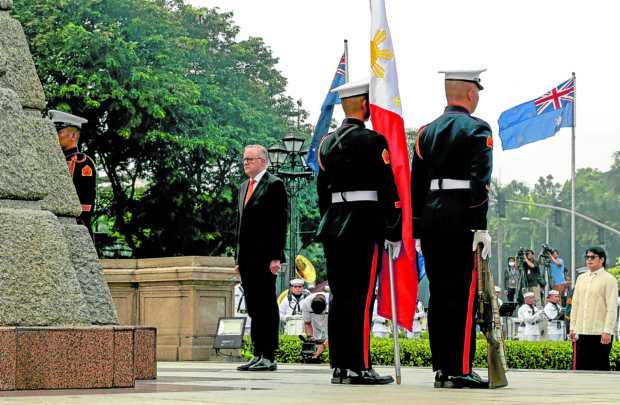
ALLY FROM DOWN UNDER Australian Prime Minister Anthony Albanese arrives for a wreath-laying ceremony at the Rizal monument in Manila on Friday. He was the first Australian PM
to visit the country since 2003. —MALACAÑANG PHOTO
President Marcos and Australian Prime Minister Anthony Albanese signed a strategic partnership agreement on Friday expanding cooperation in various fields, including defense and security, in a move seen to counter China’s growing regional influence.
In a meeting prior to the signing ceremony,Marcos thanked Albanese, the first Australian prime minister to visit the Philippines since 2003, for Canberra’s continuing support for Manila in the South China Sea dispute with Beijing.
“This signing of a joint declaration of strategic partnership signals our mutual commitment to deepening collaboration across a spectrum of areas that are vital to both our country’s growth and prosperity,” Marcos said in a speech.
No. 2 defense partner
In response, Albanese said “This elevation is an important symbol of the strength of our relationship and our shared commitment to do more together.” The partnership seeks to foster cooperation in defense and maritime security, counterterrorism and law enforcement, climate action, education and people-to-people exchanges, according to the Presidential Communications Office (PCO).
According to Secretary Cheloy Garafil, the PCO chief, Australia is now the country’s second largest partner in defense and security (next to the United States), its 14th largest trading partner in 2022, and its 11th largest source of Official Development Assistance (ODA), which amounted to $180 million as of December last year.
‘Terribly important’
Albanese’s visit follows a series of trips by senior members of his government to the archipelago nation since Marcos took office in 2022.
A strategic partnership is the highest level of bilateral ties that Australia has had with the Philippines.
At Friday’s meeting, Mr. Marcos said Philippine-Australian relations had become “terribly important” in the face of recurring tensions between Philippine and Chinese vessels in the West Philippine Sea.
Albanese assured Marcos that Australia would remain consistent in its position, adding: “We have collective responsibility for security, including support for the UN Convention on the Law of the Sea. Unclos, that’s very important.”
Joint military drills
“Australia does support, as I said at the East Asia Summit, the 2016 South China Sea arbitral award. That is final and it’s binding and it’s important that that be upheld going forward,” he added.
Under a Visiting Forces Agreement with Australia, Manila has announced plans to conduct joint patrols with Canberra in the South China Sea.
Last month, Philippine and Australian forces held joint military exercises in Zambales and Palawan, two provinces facing the West Philippine Sea.
The event was watched by President Marcos, Philippine Defense Minister Gilberto Teodoro and Australian Defense Minister Richard Marles.
At the time, Marcos hailed the drills as “an important aspect of how we prepare for any eventuality.”
‘Mistake’
Among other agreements signed during Friday’s talks was a memorandum of understanding for reciprocal work and holiday visas. The countries also agreed to hold an annual defense ministers’ meeting.
Human Rights Watch (HRW) had called on Albanese to also “seriously” discuss human rights during his talks with Mr. Marcos, including pushing for an end to the deadly drug war started by former President Rodrigo Duterte.
“The Australian government should recognize that it would be a mistake to deepen defense and security ties with the Philippines while ignoring human rights concerns,” Australia director for HRW Daniela Gavshon said ahead of the talks.“A security partner that routinely violates basic human rights will ultimately provide little safety and security for anyone.”